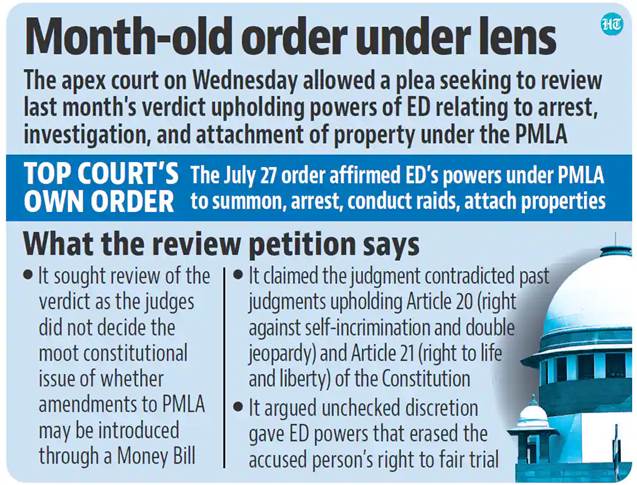Description

Copyright infringement not intended
In News
- The Supreme Court of India will review its judgment to uphold key provisions of the Prevention of Money Laundering Act (PMLA), 2002.
- Recently more than 240 petitions have challenged the money laundering law in court and requested for Review Petition.
Background of the Review Petition
- In July 2022, the Supreme Court in the Vijay Madanlal Choudhary & Ors v Union of India case judgment upheld the key provisions of the Prevention of Money Laundering Act (PMLA).
- A verdict by the Supreme Court is final and binding. However, under Article 137 of the Indian Constitution Supreme Court has the power to review its judgments or orders.
- A review petition must be filed within 30 days of the judgment.
- Generally, the review petition is heard in an open court.
- However, in cases of the death penalty, review petitions are heard in judge chambers, not in an open court.
- The Supreme Court rarely considers reviews of its rulings. A review is allowed on limited grounds to correct grave errors that have resulted in a miscarriage of justice.
Arguments behind PMLA Review petition
- On several occasions (in 2015, 2016, 2018, and 2019), PMLA was amended to introduce reforms related to bail and the classification of offences through the Finance Act.
- The major criticism is that the PMLA amendments do not qualify as a Money Bill under Article 110 of the Indian Constitution.
- The PMLA amendments violated Article 20(1) of the Indian Constitution.
- Under Article 20(1) no person should be convicted of any offence, except for violation of the law in force at the time of the execution of the act charged as an offence.
- The SC verdict upheld strict bail conditions under PMLA that set a reverse burden of proof on the accused.
- The petitioners stated that “in the absence of an FIR (or equivalent), Complaint (charge sheet), case diary (not maintained), and other documents, no accused can present facts and prove his/her innocence to the Special Court.
- The Supreme Court verdict upheld that officers of the Enforcement Directorate (ED) not needed to provide a copy of the Enforcement Case Information Report (ECIR) to the accused or arrested person.

Enforcement Directorate
- In 1956, Enforcement Directorate was founded as the "Enforcement Unit" within the Department of Economic Affairs under the Ministry of Finance.
- The Enforcement Directorate investigate cases related to;
- Economic crimes.
- Violations of foreign exchange laws.
- At present Enforcement Directorate deals with 4 laws
- The Prevention of Money Laundering Act, 2002 (PMLA)
- The Foreign Exchange Management Act, 1999 (FEMA)
- The Fugitive Economic Offenders Act, 2018 (FEOA)
- Conservation of Foreign Exchange and Prevention of Smuggling Activities Act, 1974 (COFEPOSA)
- Currently, the Enforcement Directorate (ED) is administered by the Internal Security Department under the Ministry of Home Affairs.
Prevention of Money Laundering Act, 2002
- Prevention of Money Laundering Act, 2002 was passed by the Indian parliament to prevent money laundering and to provide for confiscation of property derived from money laundering.
- PMLA came into effect on 1st July 2005.
- The Act prescribes that any person found guilty of money laundering shall be jailed from 3 years to 7 years; the maximum punishment may extend to 10 years instead of 7 years.
- The Director or officer above the Deputy Director rank with the Director's authority can attach property believed to be "proceeds of crime" for 180 days.
- The Adjudicating Authority is the authority appointed by the central government to exercise jurisdiction, powers and authority conferred under PMLA.
- The Adjudicating Authority shall not be bound by the procedure laid down by the Code of Civil Procedure, 1908. Still, it shall be guided by the principles of natural justice and subject to the other provisions of PMLA.
- A person, who is accused of having committed the offence of money laundering, has to prove that alleged proceeds of crime are lawful property.
- An Appellate Tribunal is the body appointed by Union Government.
- It has the power to hear appeals against the orders of the Adjudicating Authority and any other authority under the Act.
https://indianexpress.com/article/explained/supreme-court-pmla-judgment-review-money-laundering-act-8109974/
https://t.me/+hJqMV1O0se03Njk9













